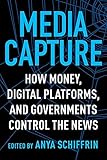Media Capture : How Money, Digital Platforms, and Governments Control the News / ed. by Anya Schiffrin.
Material type: TextPublisher: New York, NY : Columbia University Press, [2021]Copyright date: ©2021Description: 1 online resourceContent type:
TextPublisher: New York, NY : Columbia University Press, [2021]Copyright date: ©2021Description: 1 online resourceContent type: - 9780231548021
- 323.44/5 23
- PN4735 .M435 2021
- online - DeGruyter
| Item type | Current library | Call number | URL | Status | Notes | Barcode | |
|---|---|---|---|---|---|---|---|
 eBook
eBook
|
Biblioteca "Angelicum" Pont. Univ. S.Tommaso d'Aquino Nuvola online | online - DeGruyter (Browse shelf(Opens below)) | Online access | Not for loan (Accesso limitato) | Accesso per gli utenti autorizzati / Access for authorized users | (dgr)9780231548021 |
Frontmatter -- CONTENTS -- Part I. Overview -- Introduction -- Chapter One. How Silicon Valley Copied Wall Street’s Media Capture Playbook -- Chapter Two. From Media Capture to Platform Capture -- Chapter Three. Media Capture and the Crisis in Local Journalism -- Chapter Four. Nobody Home -- Part II. Examples of Problems -- Chapter Five. A Serf on Google’s Farm -- Chapter Six. The Rise and Fall of Blogging in the 2000s -- Chapter Seven. Digital Payola: Policing the Open Contributor Network -- Chapter Eight. Media Capture and the Corporate Education- Reform Philanthropies -- Chapter Nine. Using Old Media to Capture New in Turkey -- Chapter Ten. A Loud Silence -- Chapter Eleven. The Capture of Britain’s Feral Beast -- Part III. Solutions -- Chapter Twelve. A Global Strategy for Combating Media Capture -- Chapter Thirteen. The Hamster Wheel, Triumphant: Commercial Models for Journalism Are Not Working; Let’s Try Something Else -- Chapter Fourteen. Building Trust (and a Trust) -- Chapter Fifteen. Defending Vanguard Journalists -- Chapter Sixteen. Do Technology Companies Care About Journalism -- LIST OF CONTRIBUTORS -- INDEX
restricted access online access with authorization star
http://purl.org/coar/access_right/c_16ec
Who controls the media today? There are many media systems across the globe that claim to be free yet whose independence has been eroded. As demagogues rise, independent voices have been squeezed out. Corporate-owned media companies that act in the service of power increasingly exercise soft censorship. Tech giants such as Facebook and Google have dramatically changed how people access information, with consequences that are only beginning to be felt.This book features pathbreaking analysis from journalists and academics of the changing nature and peril of media capture—how formerly independent institutions fall under the sway of governments, plutocrats, and corporations. Contributors including Emily Bell, Felix Salmon, Joshua Marshall, Joel Simon, and Nikki Usher analyze diverse cases of media capture worldwide, many drawn from firsthand experience. They examine the role played by new media companies and funders, showing how the confluence of the growth of big tech and falling revenues for legacy media has led to new forms of control. Contributions also shed light on how the rise of right-wing populists has catalyzed the crisis of global media. They also chart a way forward, exploring the growing need for a policy response and sustainable models for public-interest investigative journalism. Providing valuable insight into today’s urgent threats to media independence, Media Capture is essential reading for anyone concerned with defending press freedom in the digital age.
Mode of access: Internet via World Wide Web.
In English.
Description based on online resource; title from PDF title page (publisher's Web site, viewed 01. Dez 2022)


